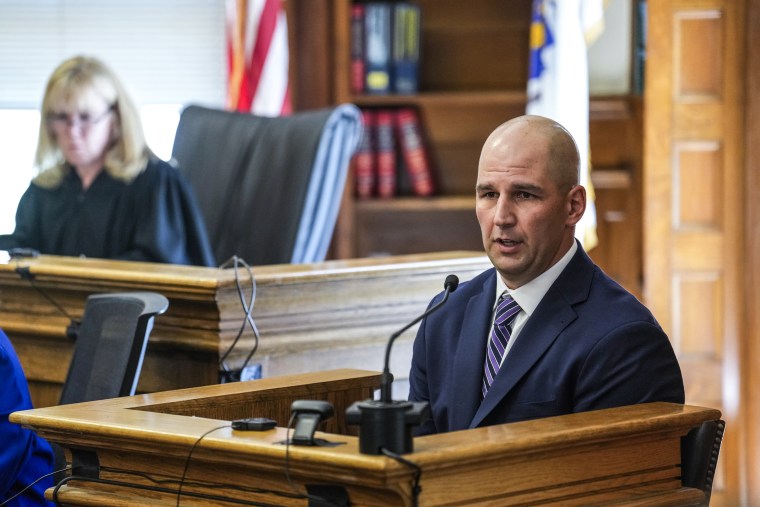During a long and widely watched trial last year, Karen Read was prosecuted for murder in the 2022 death of her boyfriend, Boston Police Officer John O’Keefe.
The trial, which included allegations of police misconduct and of a wide-ranging conspiracy among law enforcement officers to frame Read in the killing, ended in a hung jury.
Jury selection in Read’s retrial on charges of second-degree murder, motor vehicle manslaughter while driving under the influence and leaving the scene of a collision causing death is set to begin Tuesday in a courtroom outside Boston.
Here’s what to know about the case.
How did John O’Keefe die?
O’Keefe, 46, had been a police officer for 16 years. He was found unresponsive on a snowy January morning outside the suburban home of Brian Albert, a now-retired Boston police sergeant.
O’Keefe was pronounced dead shortly after, and the medical examiner attributed the cause to blunt force trauma to the head and hypothermia. Read, then an equity analyst who had been dating O’Keefe for two years, was arrested in connection with his death days later.

When Read was tried in 2024, the Norfolk County District Attorney’s Office pointed to the couple’s troubled relationship as a possible motive in the killing and accused her of striking O’Keefe outside the sergeant’s home with her Lexus SUV after a night of heavy drinking.
The death was not captured on camera, and no eyewitnesses claimed to have seen what happened. But Assistant District Attorney Adam Lally told the jury that vehicle data from Read’s SUV showed her traveling backward for 60 feet at 24 mph outside Albert’s home around the time that she was dropping O’Keefe off at a party there.
O’Keefe’s hair was found on the vehicle’s bumper, and his DNA was on the SUV’s broken taillight, Lally told the jury. The remnants of a cocktail he appeared to have left a bar with earlier that night were also found on the bumper, as were bits of what Lally described as a drinking glass.
What did the defense say?
Read asserted her innocence and her defense team accused Albert and others who’d been at the party — including an agent with the Bureau of Alcohol, Tobacco, Firearms and Explosives whom Read had exchanged flirty texts with — of fatally assaulting O’Keefe and framing Read for the killing. (Albert testified that O’Keefe never came inside his home but that he would have been “welcomed with open arms” if he had.)
The defense also accused the lead investigator in the case, Massachusetts State Trooper Michael Proctor, of manipulating evidence and conducting a biased investigation. Text messages introduced at trial showed Proctor using offensive and derogatory language to describe Read to family, friends and supervisors.

Proctor had undisclosed ties to Albert and his family, Read’s lawyers said, and he shared investigative details with his sister, who was close friends with Albert’s sister-in-law.
Proctor acknowledged discussing the case with his sister, though he said he shared only “newsworthy stuff,” and he testified that his unprofessional language “dehumanized” Read. But he said his conduct did not compromise the integrity of the investigation into O’Keefe’s death.
After a nine-week trial and five days of deliberations, a jury was unable to reach a unanimous verdict, and Norfolk County Superior Court Judge Beverly Cannone declared a mistrial.
What happened next?
Days later, the Massachusetts State Police placed Proctor on unpaid leave over what the agency described as allegations of “serious misconduct” raised at trial. The trooper was fired last month after a state police trial board examined the allegations and found that he had violated agency rules by sending derogatory and defamatory texts about Read and shared sensitive investigative details with non-law enforcement personnel.
Proctor also drank while on duty and drove his cruiser, according to the trial board’s findings.
Proctor has not publicly commented on his termination, but his family said the text messages “prove one thing, and that Michael is human — not corrupt, not incompetent in his role as a homicide detective, and certainly not unfit to continue to be a Massachusetts State Trooper.”
“Despite the Massachusetts State Police’s dubious and relentless efforts to find more inculpatory evidence against Michael Proctor on his phones, computers and cruiser data, the messages on his personal phone — referring to the person who killed a fellow beloved Boston Police Officer — are all that they found,” the family said.
Separately, Read’s attorneys tried to have the case thrown out over claims that Read was the victim of “extraordinary governmental misconduct.” They also claimed her retrial amounted to double jeopardy because, after the mistrial, two jurors told the defense team that the panel would have acquitted Read of murder and leaving the scene of a collision causing death.
Prosecutors disputed those claims and judges have denied both claims.
What will be different in a second trial?
The prosecution tapped Hank Brennan, a former prosecutor and longtime criminal defense attorney who represented Boston gangster James “Whitey” Bulger, to retry the case as special counsel and lead prosecutor.
The defense team also added a lawyer — Victoria George, who served as an alternate juror during the first trial. “I waited for nearly a year after the mistrial, hoping the court system would work as intended to remedy some of the wrongs in this case,” she told Vanity Fair magazine.
It isn’t clear what role Proctor will play. He has appeared on witness lists filed by both the defense and prosecution, but legal experts said that his termination adds a level of uncertainty to the proceedings.
“At the time of his original testimony, he still had a job to rein him in,” Stara Roemer, a former Dallas County prosecutor who is now a criminal defense lawyer in Texas, told NBC News. “Now that he no longer has that job, who knows what could come out of his mouth.”
Also included on an amended witness list from the prosecution are three of Read’s attorneys — Alan Jackson, David Yanetti and Elizabeth Little.
“It may be necessary to call defense counsels to authenticate the defendant’s numerous public statements,” prosecutors said in the filing, according to NBC Boston.
